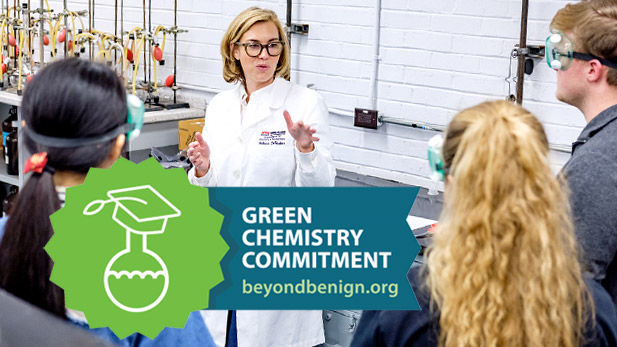Rose-Hulman Makes Green Chemistry Commitment

Rose-Hulman becomes the first Indiana college to adopt a commitment to incorporate green chemistry theory and practices into classes, continuously improve green chemistry accessibility, and work toward a sustainable future.
Rose-Hulman and its Department of Chemistry and Biochemistry have adopted a new Green Chemistry Commitment to incorporate green chemistry theory and practice into classes, continuously improve green chemistry accessibility, and work toward a sustainable future.
The institute becomes Indiana’s first higher education institution to adopt this commitment, organized by the Beyond Benign green chemistry teaching and learning community. Rose-Hulman joins a growing list of currently 50 other colleges and universities across America.
Chemistry and Biochemistry Professor Rebecca DeVasher, PhD, said Rose-Hulman’s faculty-led Green Chemistry Commitment comes at an appropriate time, as the institute opened new chemistry and biochemistry laboratories in the New Academic Building last fall. Take a tour of the new labs.
The commitment is being supported by DeVasher’s department faculty colleagues and all campus administrators.
“This pledge has strong alignment with Rose-Hulman’s educational mission and vision toward helping our students become ‘inspired and prepared for lives of purpose and success,’” said DeVasher, who leads an active research program in green chemistry on campus. In this work, she seeks to elucidate mechanistic details that support environmentally benign processes.
Visit this page to learn more about Rose-Hulman’s Green Chemistry Commitment.
Green chemistry involves the application of 12 principles to reduce or eliminate hazardous substances and make chemical processes safer, noted Associate Professor of Chemistry and Biochemistry Stephanie Poland, PhD, who also specializes in green chemistry and has active research projects dealing with carbon dioxide utilization and atom-economic polymerizations.
“We hope to use green chemistry principles to further challenge and engage our students,” she said.
Ross Weatherman, PhD, head of the Department of Chemistry and Biochemistry, highlighted the department’s continued engagement with industrial experts in chemical waste remediation and treatment. This commitment will further ensure students being well-prepared leaders in both small-scale and large-scale sustainability efforts.
“The partnership with Beyond Benign facilitates community support and activity that we hope adds value to both programs,” said Weatherman.
Learn more about the Rose-Hulman at www.rose-hulman.edu. To apply, visit www.rose-hulman.edu/admissions.